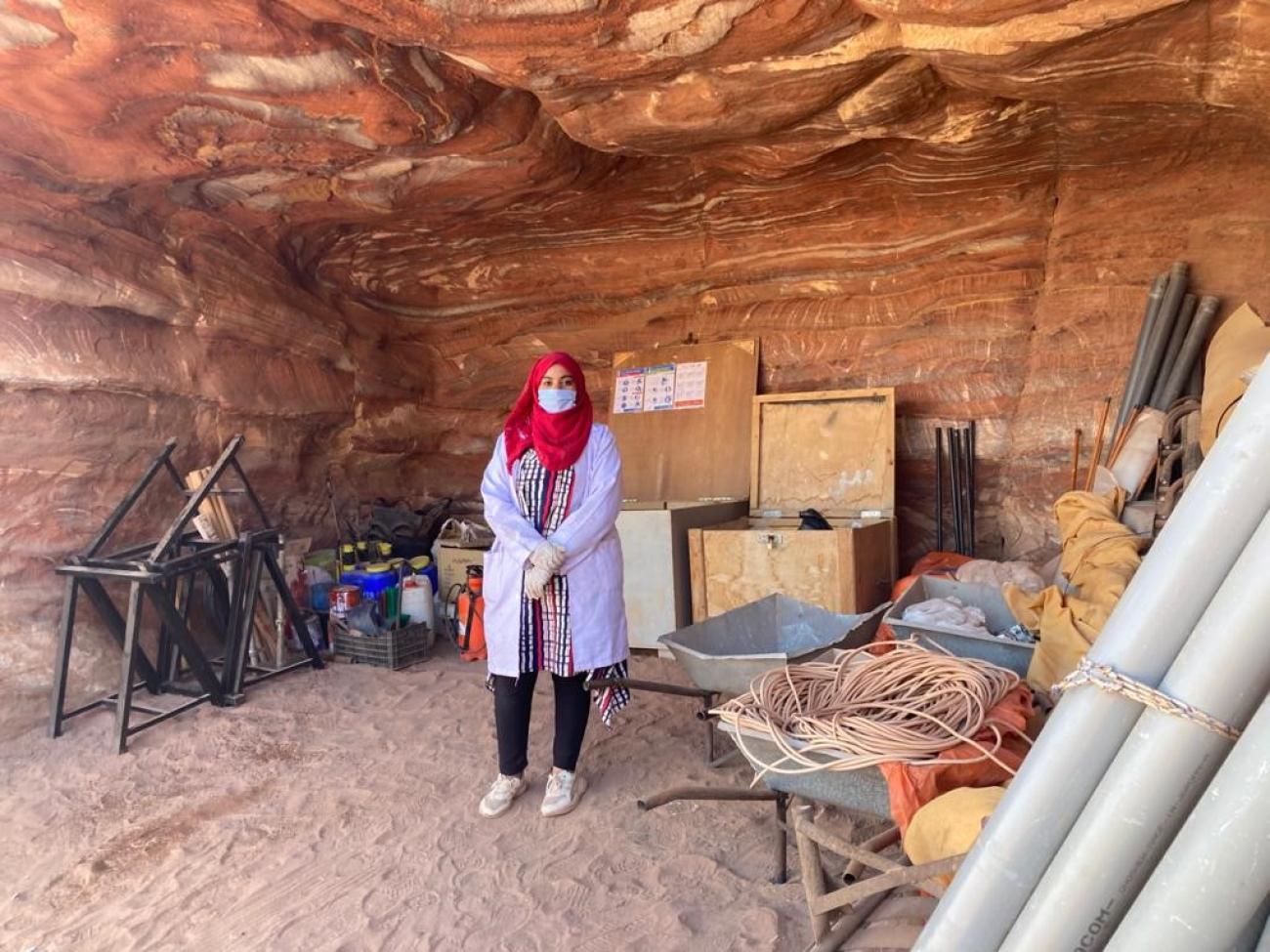Cultural heritage preservation fosters women employment in Petra during pandemic

Before joining the UNESCO project, Suzan mainly helped support her family at home.
COVID-19 has changed the way we all live and work, and UNESCO has adapted its projects to provide a safer working environment. To allow for this, UNESCO ensures that its projects are aligned with the Government of Jordan’s Ministry of Labour regulations regarding the safety recommendations to be put in place for Cash-for-Work personnel.
This adaption has provided new roles for workers such as Suzan Jdeilat, 22, from Um Sayhun in Petra. “I distribute Personal Protective Equipment items when needed,” says Suzan, “I am also in charge of monitoring the storage and inventory on the site, as well as handle the handover of inventory from/to the guards each day and assist the workers in providing them with the needed tools to carry out their works”. Suzan is currently taking part in the Cash-for-Work mechanism of UNESCO project, “Employment Opportunities for Cultural Heritage Safeguarding in Jordan”.
This project is being implemented by UNESCO with the “Deutsche Gesellschaft für Internationale Zusammenarbeit GmbH” (GIZ), and is part of the Federal Ministry of Economic Cooperation and Development, Germany (BMZ) Special Initiative ‘Tackling the root causes of migration, stabilizing host regions, supporting refugees’. Its focus being, to provide short-term employment opportunities and training in the cultural heritage preservation sector at two sites in Jordan.
Before joining the UNESCO project, Suzan mainly helped support her family at home. “I would help my siblings with their homework, as my dad is living with a disability that limits his mobility, and my mom is usually taking care of livestock. In addition, I also took care of all of the house chores and meal preparations,” she says and adds, “Mansaf is my specialty!” The project that Suzan is a part of looks to leverage culture to enhance resilience in local communities through a Cash-for-Work mechanism that links humanitarian and development assistance by providing employment opportunities to vulnerable Jordanians and Syrians living in host communities.
"Local communities play a crucial role in the maintenance and conservation of heritage sites. As part of this project, UNESCO seeks to provide local community members with the relevant skills to carry out basic site maintenance and rehabilitation while enhancing their self-reliance," says Marina Patrier, Officer in Charge of the UNESCO Amman Office
When asked why she wanted to become involved in the Cash-for-Work activities, Suzan said, “I want to save up and pay for my last year of school (Tawjihi)”. She places a great importance on education, and is happy to be part of the UNESCO project as she not only finds it interesting, but it also helps her towards her goals. Contributing to cultural heritage preservation and supporting her community is also a good motivator for Suzan. “Petra is my home, and preserving it will contribute to making our home a better place,” she says “by preserving the culture and ensuring flow of tourism, it will improve the economic situation of the local community.”
UNESCO is committed to achieving workforce diversity in terms of gender, nationality and culture. This project specifically adheres to the Cash-for-Work Standard Operating Procedures for Jordan. In full partnership and coordination with the Petra Development and Tourism Region Authority (PDTRA) and the Department of Antiquities of Jordan (DoA), the project in Petra aims at creating 160 job opportunities for skilled and semiskilled workers over a period of 6 months.
To carry out the project activities, UNESCO works with the Association of Volunteers for International Service (AVSI), local associations, as well as national and international specialized conservation and restoration experts. Furthermore, the site maintenance plans were prepared in coordination with the German Jordanian University, School of Architecture and Built Environment. UNESCO looks to promote greater community engagement in the rehabilitation and conservation of the heritage sites, and the project that Suzan is a part of seeks to promote job creation in the cultural heritage sector and encourage sustainable tourism in the long term.
While Suzan is enjoying working and learning with UNESCO, she is also excited about her future, “I want to complete my high school education and apply for a diploma to become a flight attendant. I would love to travel around and learn about new cultures.”



